
Trafalgar is a 1971 album by the Bee Gees. It was their ninth album, and was released in September 1971 in the US, and November 1971 in the UK. The album was a moderate hit in the United States, and peaked at No. 34. The lead single "How Can You Mend a Broken Heart?" was the first Bee Gees' No. 1 single in the United States but failed to chart in Britain as did the album. It is Geoff Bridgford's only full-length appearance on a Bee Gees album as an official member.
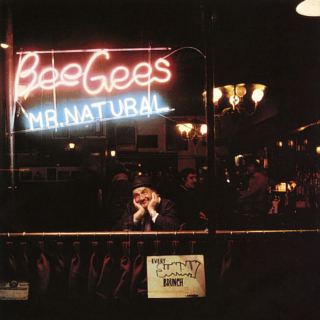
Mr. Natural is the Bee Gees' twelfth album, released in May 1974. It was the first Bee Gees release produced by Arif Mardin, who was partially responsible for launching the group's later major success with the follow-up album Main Course. The album's rhythm and blues, soul, funk and hard rock sounds initiated the group's reinvention as a disco and blue-eyed soul act, which would solidify on subsequent albums. However, Barry Gibb has said that the album was "whiter" than Main Course. The cover photograph was taken at 334 West 4th Street, Greenwich Village, New York City by Frank Moscati, which is today known as The Corner Bistro tavern.

Size Isn't Everything is the twentieth studio album by the Bee Gees, released in the UK on 13 September 1993, and the US on 2 November of the same year. The brothers abandoned the contemporary dance feel of the previous album High Civilization and went for what they would describe as "A return to our sound before Saturday Night Fever".

"Night Fever" is a song written and performed by the Bee Gees. It first appeared on the soundtrack to Saturday Night Fever on RSO Records. Producer Robert Stigwood wanted to call the film Saturday Night, but singer Robin Gibb expressed hesitation at the title. Stigwood liked the title Night Fever but was wary of marketing a movie with that name. The song bounded up the Billboard charts while the Bee Gees’ two previous hits from Saturday Night Fever soundtrack were still in the top ten. The record debuted on the Billboard Hot 100 Chart at #76, then leaped up 44 positions to #32. It then moved: 32–17–8–5–2–1. It remained at #1 for eight weeks, and ultimately spent 13 weeks in the top 10. For the first five weeks that "Night Fever" was at #1, "Stayin' Alive" was at #2. Also, for one week in March, Bee Gees related songs held five of the top positions on the Hot 100 chart, and more impressively, four of the top five positions, with "Night Fever" at the top of the list. The B-side of "Night Fever" was a live version of "Down the Road" taken from the Bee Gees 1977 album, Here at Last... Bee Gees... Live.

Spirits Having Flown is the fifteenth album released by the Bee Gees. It was the group's first album after their collaboration on the Saturday Night Fever soundtrack. The album's first three tracks were released as singles and all reached No. 1 in the US, giving the Bee Gees an unbroken run of six US chart-toppers in a one-year period and equaling a feat shared by Bing Crosby, Elvis Presley, and The Beatles. It was the first Bee Gees album to make the UK top 40 in ten years, as well as being their first and only UK No. 1 album. Spirits Having Flown also topped the charts in Australia, Canada, Germany, New Zealand, Sweden and the US. The album has sold more than 30 million copies worldwide, making it one of the best-selling albums of all time.

"Love You Inside Out" is a 1979 hit single by the Bee Gees from their album, Spirits Having Flown. It was their last chart-topping on the Billboard Hot 100, interrupting Donna Summer's "Hot Stuff", becoming the third single from the album to do so. In the UK, the single peaked at No. 13 for two weeks. It was the ninth and final number-one hit for the Bee Gees in the US, and the twelfth and final number-one hit in Canada as well. The trio would not return to the top 10 for ten years, with the song, "One".
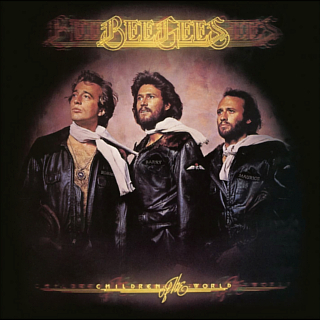
Children of the World is a 1976 album by the Bee Gees. The first single, "You Should Be Dancing", went to No. 1 in the US and Canada, and was a top ten hit in numerous other territories. It was the group's fourteenth album. The album was re-issued on CD by Reprise Records and Rhino Records in 2006. This was the first record featuring the Gibb-Galuten-Richardson production team which would have many successful collaborations in the following years.

To Whom It May Concern is the tenth album by the Bee Gees. Released in October 1972, it is the follow-up to, and continues the melancholic and personal sound of its predecessor, Trafalgar. The album was recognised as "a farewell to the old Bee Gees" as the album marked the end of an era for the group in several ways: it was their last album to be recorded solely at IBC Studios, in London, their last with conductor and arranger Bill Shepherd, who had guided them since 1967, and their last under their first contract with Robert Stigwood. Some of the songs were old ones finished or rewritten for the occasion.

Life in a Tin Can is the Bee Gees' eleventh studio album, released in January 1973.
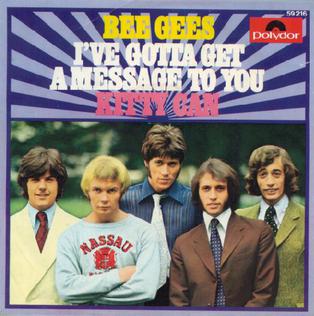
"I've Gotta Get a Message to You" is a song by the Bee Gees. Released as a single in 1968, it was their second number-one hit in the UK Singles Chart, and their first US Top 10 hit. Barry Gibb re-recorded the song with Keith Urban for his 2021 album Greenfields.
"Edge of the Universe" is a rock song by the Bee Gees, written by Barry and Robin Gibb from the album Main Course released in 1975, and also released as a B-side of "Nights on Broadway".
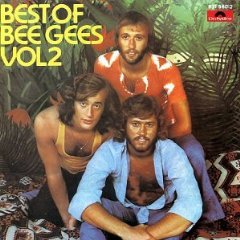
Best of Bee Gees Vol. 2 is a compilation album of hits by the Bee Gees released in 1973. The album, briefly revived on CD in the late 1980s, went out of print, but was reissued by Rhino in November 2008.

Here at Last... Bee Gees... Live is the first live album by the Bee Gees. It was recorded on December 20, 1976 at the LA Forum and was released in May 1977 by RSO Records. It reached No. 8 in the US, No. 8 in Australia, No. 1 in New Zealand and No. 2 in Spain.

"Mr. Natural" is a song by the Bee Gees, written by Barry and Robin Gibb. On 29 March 1974, it was released as a single and also released on the album of the same name in 1974. It was backed with a folk rock number "It Doesn't Matter Much to Me". The group's first single which was produced by Arif Mardin.

"My World" is a 1972 single released by the Bee Gees. It was originally released as a non-album single on 14 January 1972 worldwide. but was later included on the compilation Best of Bee Gees, Volume 2 in 1973. The flip side of the single was "On Time", a country rock number composed by Maurice Gibb. "My World" reached the Top 20 in both US and UK.

"Run to Me" is a song by the Bee Gees, the lead single and first track on the group's album To Whom It May Concern (1972). The song reached the UK Top 10 and the US Top 20.

"Boogie Child" is the third hit single from the Bee Gees' 1976 platinum album Children of the World, released in the US in early 1977. The song peaked at no. 12 on the Billboard Hot 100 as an A-side and was then used as the B-side of the single "Children of the World" in the UK. It was the last song recorded by the Bee Gees for their album Children of the World.

"Fanny (Be Tender with My Love)" is a song written and performed by the Bee Gees for their Main Course album in 1975. It was the third single release from the album, peaking at number 12 on the United States Billboard Hot 100 chart and number two in Canada. According to Maurice Gibb, producer Quincy Jones called "Fanny" one of his favorite R&B songs of all time.
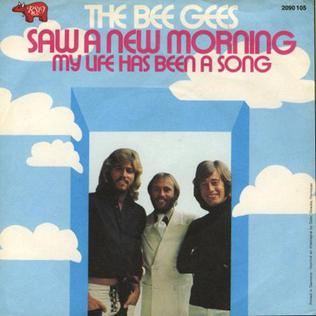
"Saw a New Morning" is the 1973 single released by the Bee Gees. It was also the group's first single released on Robert Stigwood's newly created records label RSO Records. The Bee Gees moved to Los Angeles in 1972 to record the album Life in a Tin Can which was a new direction for the group, who had been recording in England since 1967. The B-side, "My Life Has Been a Song" features lead vocal by Robin Gibb as well as Barry Gibb.
A Kick in the Head Is Worth Eight in the Pants is an unreleased studio album by the Bee Gees. Originally known as The Bee Gees Album, recording began in late 1972 at The Record Plant in Los Angeles around the same time as tracks for Life in a Tin Can were being recorded. Ten tracks were recorded in October 1972 and four more were recorded in January 1973 in London, England.


















